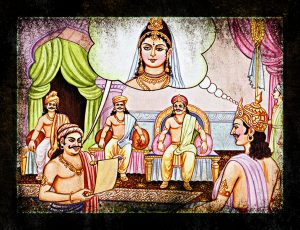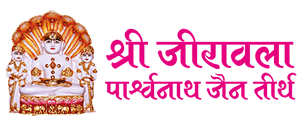
Birth, Youth, Initiation, And Omniscience Of Sri Parsva
His parents
Asvasena of the Iksvaku-family was king there, by whom other regions on all sides had been made into a court-yard by armies and horses. Sri238 was on his chest, the goddess Vac in his lotus-mouth, the sword on the couch of his hand, and the earth on his arm. With great ease he conquered his enemies; with great ease he ruled the earth; with great ease he gave wealth; with ease he did everything. A mountain-peak for the river of good conduct, a tree for the bird of virtues, he became the tying-post for the cow-elephant*, Laksmi, on earth. Kings, even though always ill-behaved like serpents, did not transgress the command of the lotus of kings.
His chief-queen, the crest-jewel of fair-eyed women, without deceit even toward her co-wives, was Queen Vama. She wore good conduct like the spotless glory of her husband, like a second Jahnavi with inherent purity. She became exceedingly dear to her husband because of these various virtues. Yet she did not take the least pride in this favor.
Birth
Now, after enjoying the greatest magnificence of a god in the heaven Pranata, King Suvamabahu’s jiva completed its life. On the fourth of the black half of Caitra, (the moon being) in Visakha, having fallen, at night he descended into Lady Vama’s womb. Then Queen Vama saw the fourteen great dreams indicating a Tirthakrt’s birth enter her mouth. The dreams being interpreted by the Indras, her husband, and astrologers, the queen, delighted, passed the time, carrying her embryo.
On the tenth of the dark half of Pausa, (the moon) in Radha (Visakha), she bore a son, dark blue in color, marked with a serpent, like the ground at the foot of a mountain bearing a jewel. The fifty-six Dikkumaris came there instantly and performed the birth-rites of the Arhat and the Arhat’s mother. Sakras came there, gave the queen a sleeping-charm, made an image of the Arhat and put it at her side. He created five forms; with one he took the Lord, with two he took chauris, and with another the umbrella over the Lord, Twirling the thunderbolt with another, going ahead with beautiful leaps, his gaze fixed on the Master’s face, his head turned, he went quickly.
Sakra arrived at the rock Atipandukambala on Meru in a moment, seated himself on a lion-throne, and took the Lord on his lap. The sixty-three Indras, Acyuta and the others, went there quickly and performed the Lord’s birth-bath properly. After placing the Lord on Isana’s lap, Saudharma’s Indra bathed him properly with water gushing from the bulls horns.239 After making the anointing and worship of the Lord of the World, Vasavas, his hands folded respectfully, began a pure hymn of praise.
Stotra
“Homage to you the color of priyangu,240B the source of kindness to the world, the sole bridge for the crossing of samsara hard to cross. Homage to you Blessed One, sole treasury of the jewels of knowledge, having the color of a blooming blue lotus, sun for the lotuses of bhavyas. Homage to you with the sign of a serpent, with the one thousand and eight favorable marks of a man, moon for dispelling the darkness of karma. Homage to you, purifier of three worlds possessor of three kinds of knowledge, spade for the ground of karma, virtuous. Homage to you, receptacle of all the supernatural powers, possessing unlimited compassion, receptacle of all magnificence, supreme spirit. Homage to you whose passions are far removed, the Ocean of Milk of joy, free from love and hate, on the way to emancipation. If there is fruit from service at your feet, Supreme Lord, then may I have this alone devotion to you in birth after birth.”
After praising the Arhat thus, he took him and put him down near Vama; and he took away the sleeping-charm and the Arhat’s image. Then Sakras went to his own place.

Childhood
At dawn Asvasena held his son’s birth-festival accompanied by releases from prison, et-cetera. While he was still in the womb, his mother saw a serpent creeping at her side on a dark night and at once told her husband. Recalling that and deciding, “That was the power of the embryo,” King Asvasena gave his son the name Parsva. The Lord of the World, cherished by nurses appointed by Indra, grew up in course of time, going from lap to lap of the kings. Nine cubits tall, he gradually reached youth, a pleasure-grove of Love, a charm for (attracting) women. From the blue color of his body Parsva looked as if made from the essence of blue lotuses, or rather, of the Sris of blue lotuses. Long-armed, the Lord looked like a tree with long branches; and having a broad, firm chest, he looked like an immovable mountain. From his hands, feet, face and eyes, Asvasena’s son had the beautiful appearance of a pool with a bed of blooming lotuses. Marked with the thunderbolt, et-cetera, slender-waisted, flat-bellied, the Lord had mortise, collar, and pin joints.241 After seeing the Lord with such beauty, goddesses reflected, “They are blessed on earth, whose husband he will be.”
Story of Prabhavati
One day King Asvasena, who was devoted to stories of the Jain religion, sitting in his council, was told by the door-keeper who approached him: “O king, there is a man at the door of good appearance who wishes to make a request of the Master. Favor me by giving instructions.” King Asvasena said: “Have him enter quickly. For all who wish to make a request must be recognized by kings who observe the law.” Admitted by the door-keeper, he bowed to the king and sat down on a seat indicated by the door-keeper. The king said to him: “Sir, whose son are you? Who are you? For what reason have you come here to my presence?” The man said:
“Master, here in Bharata there is a city Kusasthala, like the playground of Sris. The king there, Naravarman, is like armor for those seeking a refuge*, the only wishing-tree of beggars, powerful. He subdued many kings on the border of his country, shining with sharp brilliance like the sun at the end of the world, O king. Always devoted to Jaina dharma*, eager to listen to sadhus, he directed his kingdom for a long time, powerful from unbroken law. One day, depressed by existence, he abandoned sovereignty like straw and became a mendicant in the presence of the guru Susadhu.”
When his story was thus half-told, the king, devoted to co-religionists, delighted, and causing delight to his councillors, said: “Oh! King Naravarman is discerning, knowing what is right, who thus abandoned his kingdom like straw and took the vow. For a kingdom which is acquired by kings by the exertions of many battles at the risk of their lives, is difficult to abandon even at the end of life. The wives, who are the breath of life either from themselves or from wealth, and the sons, et-cetera who are guarded, living, are difficult to abandon. Naravarman abandoned everything at once, wishing to abandon this existence. He did well. Now tell me the sequel.”
Again the man said: “In the kingdom of King Naravarman morning nor in the evening, neither by night nor by day, did the girl get rest, broken by the fever of love. Knowing that her illness was incurable by itself, her friends, with the wish to protect her, told her parents. The parents were delighted when they learned that she was in love with Parsva; and to reassure them, they said repeatedly:
‘It is a good thing that Prince Parsva, crest-jewel of three worlds, suitable for her, has been chosen as a husband by our; daughter, intelligent. Our daughter alone is at the head of ambitious women. Such a desire of another girl does not arise anywhere. We shall marry our daughter to Prince Asvaseni. For generally a wish is in accordance with the obtaining of fruit.’
Her friends went and told her father’s speech to this effect; she rejoiced at that speech like a peahen at thunder. Restored by that hope of a husband, she passed the days, counting them on her fingers, like a yogini a muttering of charms. Like a digit of the new moon, she became so thin that she looked like another bow of Kamas. Seeing their daughter very miserable, day after day, the parents decided to send her, who had chosen her husband, to Parsva. A lord of the countries, Kalinga and others, named Yavana, hard to control, learned about that and said in the assembly: ‘When I am available, why does some Parsva marry Prabhavati? Who is this King of Kusasthala who will not give her to me? Or, if mere beggars take the object given here, heroes will take all their wealth, after snatching it away.’
Saying this, his power unequaled because of many soldiers, he blocaded Kusasthala quickly in many ways. There was no entry nor exit of anyone there, like of wind in the body of a master yogis engaged in meditation.* I, being sent by the king, escaped from the city at night. I am Purusottamas, son of the minister Sagaradatta. I came here to tell you this news. Henceforth, let your Majesty do what is fitting both for your own people and the enemy-people.”
Then Asvasena, angered; his aspect dreadful from a frown, spoke a very firm speech, terrifying like the noise of a thunderbolt.”Who is this wretched Yavana? Or what fear* is there, so long as I live? I shall march with an army to protect the city Kusasthala.” With these words, Asvasena had the drum sounded and his soldiers assembled quickly at its sound.

Leave a comment